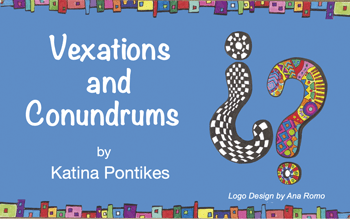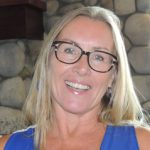Vexations and Conundrums
By Katina Pontikes
Tohubohu
All around me I feel swarming tumult. I watch news on television and the internet, and most of it speaks to disorder in our universe. However, I feel it is my duty as a human being to be informed at this critical juncture of mankind.
A raging pandemic, worldwide conflict in politics and isolation from friends and family have all contributed to feelings of inadequacy. I never prepared for all this.
That is why I jumped at the chance for enlightenment when a friend asked me to join her on a Zoom conference entitled “Hope in a Time of Disaster and Distrust.” Rev. Dr. Bill Kerley was the presenter. His background is rooted in Jungian psychology, Christianity, and Buddhism. I appreciated that there would be information from multiple spiritual perspectives. Following is my takeaway from this valuable presentation.
We do not see things clearly because we are distracted, have no practices to see and we focus on consumerism. We are broken. But something good can be made from something broken. Dr. Kerley used the metaphor of kaleidoscopes as hope, where beautiful designs come from broken glass making pictures.
Carl Jung, the famed psychologist, was asked, “Will we make it?” Dr. Kerley said we all had our own work to do to “make it.”
Dysfunctional people produce chaotic societies, which produce dysfunctional people. What a vicious cycle for mankind!
Dr. Kerley referenced the shadows we all have in our unconscious minds, and we deny them, yet what we don’t know owns us. We carry fears with us always.
We must acknowledge shadow elements and bring them to light. Some of the shadow elements are the patriarchal foundation of culture and religion, where women’s roles are limited, the notion of a flawed creation indicating something is wrong with us, authority’s need for obedience and submission, so that people do not mature, and a belief in redemptive violence (keeping arsenals of weapons). Finally, there is the shadow of racist culture, where one race dominates another.
When crisis occurs, we must own it. We are all captured. Growth means crisis will occur less, and less intensely. An example of a crisis was the attempted coup of the Capitol in the United States on January 6th. Events like this cause us deep fear for our life stability.
Where is the ray of light here? Dr. Kerley said there is hope for us. He advised we must increase our tolerance of change. I understood this to mean we should embrace progress, not fear it.
There was also discussion of the concept that no hope can flourish without a daily spiritual practice of some kind. Our presenter recommended the book When Things Fall Apart, by Pema Chodrun, an American Tibetan Buddhist nun. Gratitude exercises were one good example of a spiritual practice. If we note three positive things in our life each day, document them and then review them periodically, we will recognize our blessings.
Additionally, we must address the global issues of poverty and healthcare. I have added Covid19 eradication, world conflicts and conspiracies to this list, as I feel these too will require collective attention. We need to give what we currently witness in our lives a different story, a different meaning. There will be change, as we cannot continue along this path of business as usual. It is not working. There is an unraveling going on right now.
Do we have the will to adapt to change, to recognize how connected all mankind is? If so, our societies will take a different, and better direction.
For more information about Lake Chapala visit: www.chapala.com
- April 2024 – Issue - March 31, 2024
- April 2024 – Articles - March 31, 2024
- April 2024 - March 31, 2024








